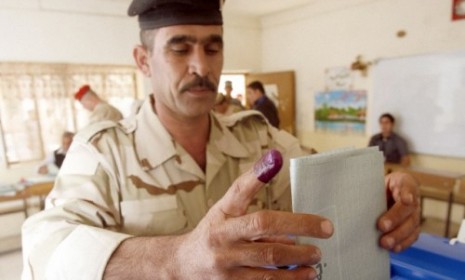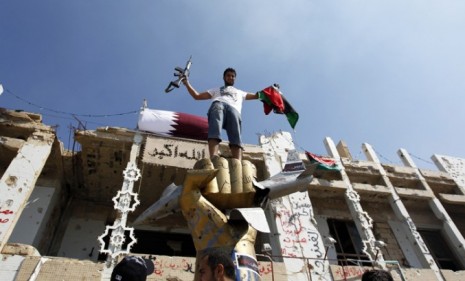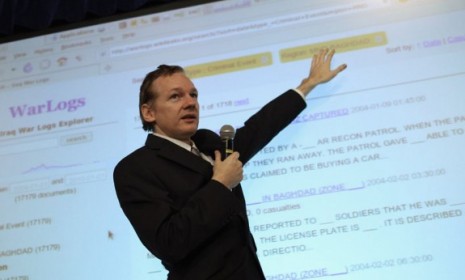Did democracy win or lose in Iraq?
Iraqis braved the bombs to cast their votes. But is the terror-marred election a step toward stability or chaos?

A free daily email with the biggest news stories of the day – and the best features from TheWeek.com
You are now subscribed
Your newsletter sign-up was successful
Iraqi voters went to the polls on Sunday, braving mortar fire and bomb blasts in Baghdad and several other cities, in a pivotal election to choose the government that will run the country as U.S. forces withdraw. At least 38 people were killed in Baghdad alone, but turnout still reached 55 percent or more, exceeding expections. While the final results aren't known yet, does the election itself constitute a victory for democracy in Iraq — or did the terrorists take the day? (Watch a report about resistance to democracy in Iraq)
The bombers failed. Democracy won: "In any other country, an outbreak of election-day violence leaving some 38 people dead would have been a major blow to democracy," says Andrew Lee Butters in Time. But in Iraq, the attacks merely gave the people another opportunity to show their "resilience." Successful elections don't guarantee stability, but they sure do help.
"Iraqis ignore violence and vote. Now the hard part"
The Week
Escape your echo chamber. Get the facts behind the news, plus analysis from multiple perspectives.

Sign up for The Week's Free Newsletters
From our morning news briefing to a weekly Good News Newsletter, get the best of The Week delivered directly to your inbox.
From our morning news briefing to a weekly Good News Newsletter, get the best of The Week delivered directly to your inbox.
The slide toward civil war continues: "The fact that this happened at all is a wondrous thing," says Andrew Sullivan in The Atlantic, and a tribute to the sacrifices of American soldiers and the stoicism of the Iraqi people. But "the mere fact of an election does not change the underlying, dangerous dynamics that can and, in my judgment, probably will tip the country back into its normal condition of civil war or dictatorship."
"'It was just the play of children that we heard'"
Too early to tell: Sunday's balloting went well, say the editors of The Economist, but success "depends on the horse-trading and coalition building that is to follow." Neither Iraq's Shiite Muslim prime minister, Nouri al-Maliki, nor his principal rival, "avowed secularist" and former prime minister Ayad Allawi, can win power without partners. To replace sectarian violence with stability, whoever wins must include -- for the first time -- a representative number of Sunnis in the Cabinet to keep Sunnis from feeling "disenfranchised."
A free daily email with the biggest news stories of the day – and the best features from TheWeek.com
-
 ‘Restaurateurs have become millionaires’
‘Restaurateurs have become millionaires’Instant Opinion Opinion, comment and editorials of the day
-
 Earth is rapidly approaching a ‘hothouse’ trajectory of warming
Earth is rapidly approaching a ‘hothouse’ trajectory of warmingThe explainer It may become impossible to fix
-
 Health insurance: Premiums soar as ACA subsidies end
Health insurance: Premiums soar as ACA subsidies endFeature 1.4 million people have dropped coverage
-
 3 ways the war in Libya failed
3 ways the war in Libya failedfeature Victory is at hand for Libya's rebels. For NATO, not so much
-
 The Iraq war logs WikiLeaks dump: 5 revelations
The Iraq war logs WikiLeaks dump: 5 revelationsfeature The secrets-sharing site has released its massive dossier on the Iraq War, detailing unreported torture, a secret body count, and a U.S.-Iranian armed skirmish